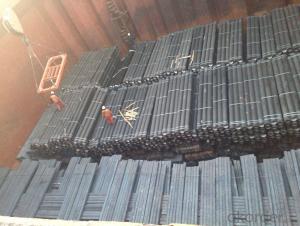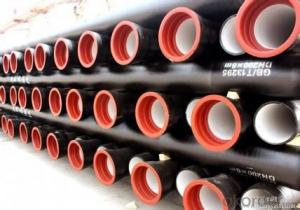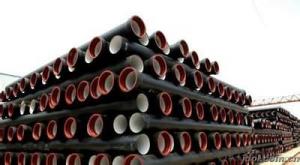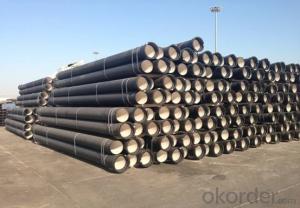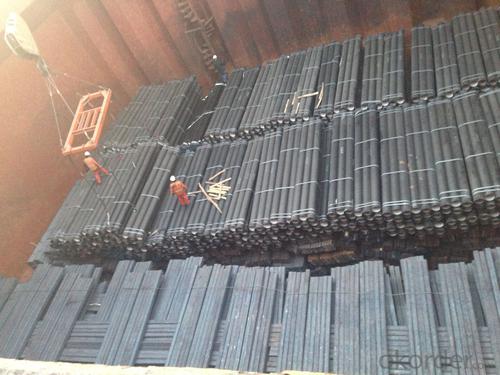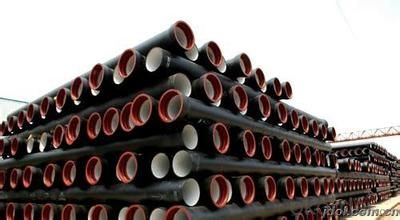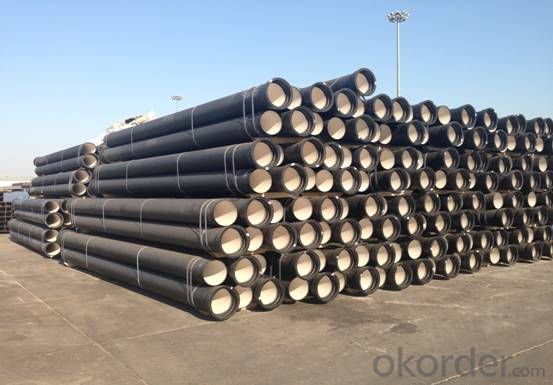DUCTILE IRON PIPE K9 DN150
- Loading Port:
- China Main Port
- Payment Terms:
- TT OR LC
- Min Order Qty:
- -
- Supply Capability:
- -
OKorder Service Pledge
OKorder Financial Service
You Might Also Like
Ductile Iron Cast Pipe is without any defects compare with tradition casting tech, which has many advantages particularly as follow:
(1) High density. In the "vertical upward casting" process, the melt iron of centre liquid column in center crystallizer is continuously feeding for volume shrinkage caused by condensation tube at outer circumference , which lead to be free of shrinkage porosity.
(2) High purity. When melt iron pouring, the mixed impurities such as gas, dross, sand grain which are lighter than melt iron could be eliminated at furnace mouth, its impossible to enter into the crystallizer through the channel, so the melt iron into the crystallizer is very pure.
(3) Strength with toughness. The cooling speed provided by continuous crystallizer is 30 times than sand casting and 5 times than centrifugal casting, and doesn't produce white iron, the eutectic cell volume of continuous cast iron is one eighth to one tenth compare with traditional cast iron. The density of graphite nodule in ductile iron can reach 300-700 pcs/mm2. Therefore, all reason above improve the strength and toughness of continuous cast iron.
(4) Free machining. The high speed cooling make the hardening phase (such as boride, steadite) not appear like reticular, massive or thick, but diffuse like fish bone and pane in shape, moreover, there are tiny graphite flakes inlaid hardening phase. It's free machining in BrinellHardness the range of 250-300HB. However, the Brinell Hardness of 250 is top limit to common metal materials.
(5) Uniform composition of tube wall. The convection mixing of liquid column caused by marching type drawing in crystallizer make the composition of tube wall well-distributed, and concentration gradient very little.
(6) High productivity. To the wall thickness of tube under 10mm, the speed of continuous casting is 1 meter/min, to the wall thickness of tube under 20mm, the speed of continuous casting is 0.5 meter/min, which is high efficiency that centrifugal or other casting tech couldn't reach.
- Q: How do ductile iron pipes handle pressure surges in pumping stations?
- Ductile iron pipes excel at effectively managing pressure surges in pumping stations. The exceptional strength and flexibility of ductile iron make it an excellent choice for withstanding sudden increases in pressure that can occur during pump start-up or shutdown. One of the standout qualities of ductile iron pipes is their remarkable capacity to absorb and distribute energy. When a pressure surge arises, these pipes can absorb the excess pressure and evenly distribute it throughout the pipe network. This capability greatly reduces the impact of the surge and safeguards against potential damage to the pipes or pumping station. Furthermore, ductile iron pipes possess a high resistance to impact and stress, which further bolsters their ability to handle pressure surges. Their manufacturing process imparts a unique strength and durability that allows them to endure the forces exerted during pressure fluctuations without significant deformation or failure. Moreover, ductile iron pipes boast a smooth internal surface that minimizes friction and turbulence within the pipe network. This smooth flow characteristic helps mitigate the effects of pressure surges by ensuring efficient movement of water without placing additional stress on the pipes. In conclusion, ductile iron pipes are meticulously engineered to handle pressure surges in pumping stations. They excel at absorbing and dissipating excess pressure, enduring impact and stress, and promoting smooth flow. Their robustness and reliability make them the ideal choice for applications where pressure fluctuations are prevalent, guaranteeing the longevity and efficiency of pumping infrastructure.
- Q: Are ductile iron pipes suitable for underground storage tanks?
- No, ductile iron pipes are not suitable for underground storage tanks.
- Q: How does ductile iron pipe perform in high-temperature steam applications?
- Ductile iron pipe performs well in high-temperature steam applications due to its inherent strength and ability to withstand thermal stress. Its high melting point and resistance to corrosion make it a reliable choice for transporting steam at elevated temperatures. Additionally, ductile iron's thermal conductivity helps to dissipate heat efficiently, ensuring the pipe's integrity and preventing potential failures.
- Q: Ductile iron pipes perennial bubbles in the water will rot it
- Ductile iron pipes mainly called centrifugal ductile iron pipe, it has the properties of nature, iron and steel, excellent corrosion resistance, good ductility, good sealing effect, simple installation, mainly for municipal, industrial and mining enterprises, water supply, gas, oil etc..
- Q: Can ductile iron pipes be used for both water and wastewater applications?
- Ductile iron pipes are versatile and can be utilized in both water and wastewater settings. Their durability, strength, and corrosion resistance make them appropriate for various purposes such as water distribution, sewage systems, and wastewater treatment plants. These pipes are specifically engineered to endure high pressure and effectively manage the flow of both water and wastewater. Furthermore, ductile iron pipes possess a lengthy lifespan, minimizing the necessity for frequent replacements and maintenance. This attribute renders them a cost-effective alternative for both water and wastewater applications.
- Q: What is the relationship between the mechanical properties of spheroidal graphite cast iron and its spheroidization rate?
- The spheroidization level reflects only the final shape of graphite. The higher the spheroidization level of ductile iron is, the better its performance is, but this is not entirely the level of spheroidization to determine.The mechanical properties of nodular cast iron are closely related to its microstructure. Different grades of ductile iron require different mechanical properties such as tensile, yield, elongation, impact and hardness.
- Q: How is ductile iron pipe tested for quality?
- Extensive quality testing is carried out on ductile iron pipe to ensure its performance and reliability in various applications. The pipe undergoes a series of steps to assess its physical and mechanical properties. The hydrostatic pressure test is one of the main tests performed on ductile iron pipe. This test involves subjecting the pipe to fluid pressure that exceeds its designed operating pressure. The purpose is to determine if the pipe can withstand internal pressure without any leakage or failure. The pipe is filled with water or another suitable fluid, and the pressure is gradually increased to the required level. During this test, the pipe is carefully inspected for any signs of leakage or deformation. Another essential test is the tensile strength test, which measures the pipe's ability to resist pulling or stretching forces. A sample of the pipe is pulled until it breaks, and the maximum force applied during the test is recorded. This test helps determine important properties such as the pipe's ultimate tensile strength, yield strength, and elongation. The Charpy test is used to assess the pipe's impact resistance. In this test, a notched sample is struck with a swinging pendulum to measure the amount of energy absorbed by the pipe. It helps determine if the pipe can withstand sudden impacts or loads without fracturing. In addition to these tests, the pipe also undergoes various non-destructive tests, including ultrasonic testing, magnetic particle inspection, and visual inspection. These tests are crucial in detecting any internal or external defects, cracks, or abnormalities that could compromise the pipe's structural integrity. Furthermore, chemical analysis and metallographic examination are performed to evaluate the chemical composition and microstructure of the ductile iron pipe. These tests ensure that the pipe meets the necessary specifications and standards for its intended application. Overall, the testing process for ductile iron pipe is thorough and stringent. Its purpose is to guarantee the pipe's quality, durability, and overall performance in safely and efficiently delivering water, wastewater, or other fluids.
- Q: Can ductile iron pipes be used for high-pressure applications?
- Yes, ductile iron pipes can be used for high-pressure applications. Ductile iron is a strong and durable material that can withstand high pressure and loads. It has excellent mechanical properties, including high tensile strength and impact resistance, making it suitable for various applications, including water and wastewater systems, oil and gas pipelines, and industrial processes. Additionally, ductile iron pipes have a high resistance to corrosion and abrasion, further enhancing their suitability for high-pressure environments. However, it is essential to consider the specific requirements and design factors of the application to ensure that the ductile iron pipes meet the necessary standards and specifications for the desired pressure range.
- Q: Can ductile iron pipes be used for underground water treatment systems?
- Indeed, underground water treatment systems can utilize ductile iron pipes. Renowned for their robustness and longevity, these pipes are well-suited for a range of uses, including underground water treatment systems. They possess exceptional resistance to corrosion, rendering them perfect for transporting water through even the harshest subterranean surroundings. Furthermore, ductile iron pipes boast a remarkable load-bearing capacity, enabling them to withstand the immense pressure and weight exerted by the soil above. Additionally, their versatility allows for simple installation and maintenance, making them a sensible option for underground water treatment systems.
- Q: Can ductile iron pipes be used in mining applications?
- Ductile iron pipes are well-suited for incorporation into mining applications due to their exceptional strength and durability. Renowned for their ability to withstand rigorous environments, such as mines, ductile iron pipes offer excellent resistance to corrosion, a crucial characteristic when dealing with water or liquids that may contain chemicals or minerals. Furthermore, these pipes possess commendable impact resistance, enabling them to endure the harsh conditions commonly encountered in mining operations. Their ease of installation and maintenance further contribute to their efficiency and cost-effectiveness in mining applications. All in all, ductile iron pipes are a dependable choice for the transportation of water, slurry, or other substances within mining operations.
Send your message to us
DUCTILE IRON PIPE K9 DN150
- Loading Port:
- China Main Port
- Payment Terms:
- TT OR LC
- Min Order Qty:
- -
- Supply Capability:
- -
OKorder Service Pledge
OKorder Financial Service
Similar products
Hot products
Hot Searches
Related keywords
